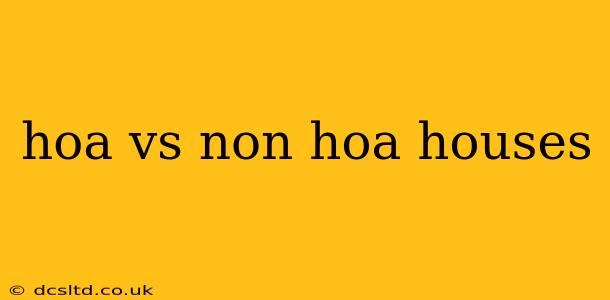Choosing between a house with a homeowner's association (HOA) and one without can be a significant decision in the home-buying process. Both options offer unique advantages and disadvantages, and the best choice depends entirely on your lifestyle, priorities, and personal preferences. This comprehensive guide will explore the key differences between HOA and non-HOA houses, helping you make an informed decision.
What is an HOA?
A homeowner's association (HOA) is a legally formed organization responsible for managing the common areas and enforcing the rules and regulations within a specific community, such as a condominium complex, planned unit development (PUD), or a subdivision. HOAs typically collect monthly or annual fees from homeowners to cover maintenance, repairs, and other community expenses.
HOA vs. Non-HOA Houses: Key Differences
The most significant difference lies in the level of control and community involvement. HOA communities offer a structured environment with established rules and regulations, while non-HOA communities provide greater autonomy but less community oversight.
HOA Houses: Pros and Cons
Pros:
- Amenities: Many HOAs provide access to amenities like swimming pools, fitness centers, playgrounds, clubhouses, and landscaped common areas.
- Maintenance: The HOA typically handles the maintenance of common areas, freeing up homeowners' time and reducing individual maintenance responsibilities. This can include landscaping, snow removal, and exterior building maintenance.
- Property Value: A well-managed HOA can contribute to maintaining or increasing property values by ensuring consistent upkeep and aesthetics within the community.
- Community: HOAs foster a sense of community through organized events and shared responsibility for maintaining the neighborhood's appearance.
Cons:
- HOA Fees: Monthly or annual fees can be substantial, adding to the overall cost of homeownership. These fees can increase over time.
- Rules and Regulations: HOAs enforce strict rules regarding property maintenance, landscaping, exterior modifications, and even pet ownership. These restrictions can limit your freedom to customize your property.
- HOA Conflicts: Disputes with the HOA can arise over rule enforcement or other community matters. Resolving these conflicts can be time-consuming and stressful.
- Lack of Control: Homeowners have limited control over HOA decisions and may not always agree with the HOA's policies or spending priorities.
Non-HOA Houses: Pros and Cons
Pros:
- Freedom and Flexibility: Homeowners have complete autonomy over their property, including the freedom to make exterior modifications, landscape as they wish, and choose their pets without restrictions.
- No HOA Fees: Eliminates the ongoing expense of monthly or annual HOA fees, freeing up your budget for other expenses.
- Greater Control: You have complete control over your property and are not subject to the decisions of an HOA board.
Cons:
- Maintenance Responsibilities: Homeowners are responsible for all maintenance, including landscaping, snow removal, and exterior repairs, which can be time-consuming and costly.
- Potential for Decreased Property Value: Lack of community-wide maintenance could potentially lead to a decline in property values if neighboring properties are not well-maintained.
- Less Community: There is less of a built-in community aspect compared to HOA communities.
- Liability: Homeowners are fully responsible for the maintenance and any liability related to their property.
Frequently Asked Questions (FAQs)
What are the typical HOA fees?
HOA fees vary widely depending on the size, amenities, and services offered by the community. They can range from a few hundred dollars to several thousand dollars per year.
Can I get out of an HOA?
Once you buy a home within an HOA community, you're typically obligated to pay the HOA fees and abide by the rules. However, selling your home is an option to exit the HOA.
What happens if I don't pay my HOA fees?
Non-payment of HOA fees can result in liens on your property, impacting your credit score and potentially leading to foreclosure.
Can I change the HOA rules?
Generally, you can't change HOA rules unilaterally. Most HOAs have established processes for proposing and voting on rule changes.
How do I choose between an HOA and a non-HOA community?
Consider your lifestyle, budget, and preferences. If you value amenities and a low-maintenance lifestyle, an HOA community might be suitable. If you prefer freedom and flexibility and are comfortable with increased maintenance responsibilities, a non-HOA community might be a better fit.
By carefully weighing the pros and cons of each option and considering your individual circumstances, you can make an informed decision about whether an HOA or a non-HOA house is right for you. Remember to thoroughly review the HOA documents if considering a property within an HOA community.
